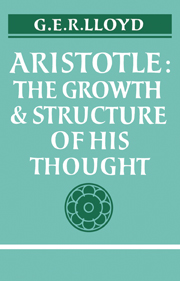Book contents
- Frontmatter
- Contents
- Preface
- Abbreviations
- PART I INTELLECTUAL DEVELOPMENT
- 1 Life and writings
- 2 The pupil of Plato
- 3 The critic of Plato
- 4 The philosopher of nature
- 5 The founder of systematic research
- PART II FUNDAMENTALS OF ARISTOTLE'S THOUGHT
- Suggestions for farther reading
- Glossary of Greek terms
- Index of passages referred to
- General Index
3 - The critic of Plato
Published online by Cambridge University Press: 06 July 2010
- Frontmatter
- Contents
- Preface
- Abbreviations
- PART I INTELLECTUAL DEVELOPMENT
- 1 Life and writings
- 2 The pupil of Plato
- 3 The critic of Plato
- 4 The philosopher of nature
- 5 The founder of systematic research
- PART II FUNDAMENTALS OF ARISTOTLE'S THOUGHT
- Suggestions for farther reading
- Glossary of Greek terms
- Index of passages referred to
- General Index
Summary
Jaeger saw Aristotle's departure from Athens in 347 as the expression of a crisis in his inner life and described that departure as a secession. Although we may readily believe that leaving Athens marked an important development in his relationship with the Academy, we know that he began to criticise the Platonists while still considering himself a member of their circle. He regularly uses the first person plural in referring to the Platonists in his critical review of their philosophy in Metaphysics A ch. 9, and even before that he had set out his objections to the theory of Forms at length in the lost work On Forms. His rejection of this central doctrine of Platonism may well date from a period when Plato was still alive. Ultimately Aristotle's criticisms of his master's theories extended over a very wide range of topics, including physics, cosmology, psychology and ethics. But the key to his reaction against the philosophy of Plato is undoubtedly his rejection of the theory of Forms. This was the corner-stone of his master's teaching and from the rejection of this doctrine many of his other minor objections stem.
Aristotle's arguments are directed not so much against the Plato we know from the Phaedo and the Republic, as against the Platonism current in the Academy in his own day. Indeed both the positions he attacked, and the arguments he used to attack them, owe a great deal to the discussions of the Academy.
- Type
- Chapter
- Information
- AristotleThe Growth and Structure of his Thought, pp. 42 - 67Publisher: Cambridge University PressPrint publication year: 1968



